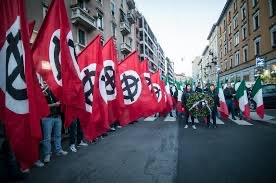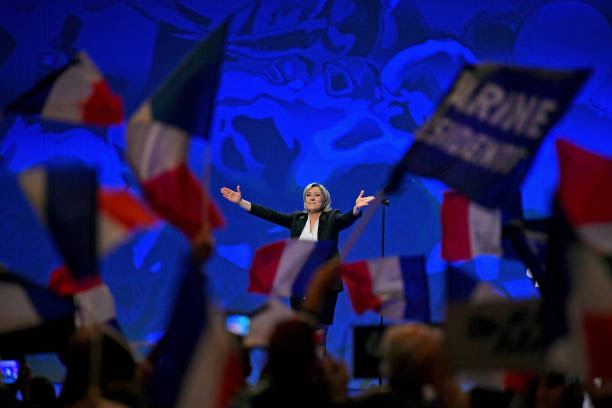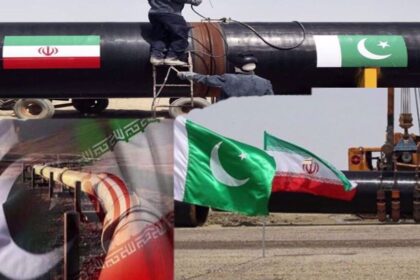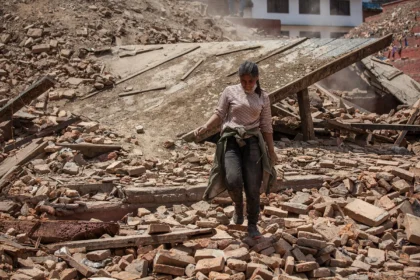The leading political critic, Noam Chomsky, once said that no form of authority should be trusted. “That ought to be second nature,” he added. “I mean, you don’t trust authority!”
Years later, this statement stands just as relevant. 2024 has seen ideological warfare beyond the precipice of good and evil. With most countries experiencing elections, there was an opportunity to revive the democratic legacy the global fabric so often prides itself on. Yet it comes as no surprise that a world order, dancing within the volatile interplay of fractured diplomacy and shifting allegiances, would pause to consider the will of the people—le prolétariat, as one would say.
In the various illiberal inclinations that have resurrected this year, the chilling resurgence of neo-fascism, masked as populism, seems to be predominant. For the more amateur readers, it is simply Hitler 1.2 but trendier, so you will be experiencing major FOMO if you choose to skip the party and go home early. From an objective lens, it is outright preposterous. Ask any self-proclaimed humanitarian whether racial supremacy should persist. (But that’s centenarian!) Certainly, more years accounted for than Israel’s nativist propaganda. And now you’re antisemitic. This is a more nuanced rabbit hole than the IDF’s entire pinkwashing campaign, but we’ll talk about it when we get there.

A neo-fascist analysis without the most progressive nation in the world seems bland, so we must address the elephant in the room: the United States of America (and Alaska, Cuba, Puerto Rico, Guam…). While the US has never been an effective example of democracy—except when Wall Street is in trouble—it has fundamentally been behind the destruction of any semblance of a republic. 2024 saw the United States at the forefront of the global stage, as the presidential elections underscored the nation’s ideological gulf. Kamala Harris, aiming to become the first elected female president, ran a campaign centred on reproductive rights, gun control, and why the bad, bad Republicans should not be trusted. Donald Trump, on the other hand, leveraged his MAGA cult with a vengeance, attacking Harris as a “socialist lunatic” (he only missed it by a few feet) and framing himself as the saviour of the American Dream. The polarised rhetoric highlighted the United States’ ideological chasm, with democracy itself appearing fragile under the strain of election denialism and culture wars.
In the wake of Trump’s victory, the United States (and consequently, inevitably, the world) finds itself grappling with a new era of political uncertainty. Jerry Harris was on point when he said that the Right has been studying the work of Antonio Gramsci for years—in order to articulate the most effective cultural revolution for the already numbing American intelligence. Also, Project 2025 sucks. For Donald Trump, who hates the “deep state”—the elite infiltration of public-serving institutions—the Project balances his outsider status with his totalitarian capacity to rule. The indoctrination of conservative values, idealised by the Project, along with concerns for a stricter immigration policy, is a destructive symptom of fascist structure invading America’s counterparts in a post-9/11 world. These xenophobic aspirations will predictably trickle down the same pipeline of Islamophobia and NATO-sponsored terrorism in the Global South and Middle East. The recent regime shift in Syria is a prime example of how Project 2025 will continue employing proxy wars in the name of the Holy Father. And the world will watch.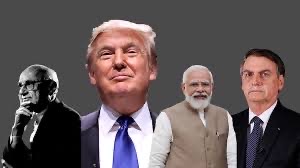
While the U.S. is embroiled in its ideological battle, Europe is witnessing a similar surge in populism. A less intense but equally riveting situation is the populist tug-of-war happening in France. Marine Le Pen’s National Rally made historic gains in both the French and European Parliaments, an opportunist exploitation of the preceding dissatisfaction with Emmanuel Macron’s failed balance of liberal and stringent policymaking—particularly after his address at the Sorbonne, where he called for deeper European integration, which was perceived as a disconnect to the French electorate.
Le Pen’s Rassemblement Party’s victory can be credited to its strategic de-demonisation, successfully marketing itself as a legitimate representative of the secular class and protecting against the doomed threat of radical Islam. For the less critical bunch in France, this rebranding was equivalent to the convenient forgetfulness towards Shein’s enslavement of Uyghur labour despite the French Kill Bill.
The RN, despite its saviour complex and mostly moderate rhetoric, is the face of the same authoritarian tendencies, nationalist agenda, and exclusionary legislative campaigns reminiscent of fascist movements. France’s position in the European Union, as well as the NATO Alliance plaguing stability in every susceptible nation, is an essential element of the discourse surrounding Muslim and third-world rights.
However, the rise of neo-fascism is not confined to the Western world. In Russia, Vladimir Putin’s regime has metamorphosed into a textbook example of neo-fascism cloaked in the guise of nationalism and neo-imperial ambition. Drawing heavily on historical grievances and narratives of Western betrayal, Putin justifies actions like the annexation of Crimea and the invasion of Ukraine as defenses of a “greater Russia.” Propaganda paints these acts as both inevitable and righteous, leveraging ethnic nationalism and Orthodox Christianity to consolidate internal support.
The rhetoric of protecting ethnic Russians abroad and reclaiming past glory blends authoritarian control with fervent patriotism. Internally, the Kremlin has stamped out dissent by targeting independent media, arresting opposition leaders, and criminalising peaceful protests under sweeping anti-extremism laws. This draconian governance isolates citizens, fostering a collective identity bound by fear and loyalty to the state. Putin’s Russia encapsulates how modern regimes manipulate historical myth and cultural identity to sustain neofascist governance.
Meanwhile, across the Black Sea, Turkey is following a similar trajectory. Turkish President Recep Tayyip Erdogan’s ascent from a moderate reformist to an increasingly authoritarian leader has carved a neo-fascist path tailored to Turkey’s sociopolitical landscape. Erdogan’s regime utilises Islamist nationalism to centralise power, eroding secular principles foundational to the Turkish Republic. The 2016 failed coup attempt provided a pretext for a crackdown, enabling purges of the military, judiciary, and academia, alongside imprisonments of journalists and political opponents. Policies targeting Kurdish minorities and dissenters—framed as necessary for national security—exemplify the scapegoating mechanisms central to its governance.
Similarly, under Prime Minister Narendra Modi, India has witnessed a troubling tilt toward ethnonationalism rooted in Hindutva ideology. This vision seeks to establish India as a Hindu Rashtra, marginalising religious minorities, particularly Muslims. Policies like the Citizenship Amendment Act and the proposed National Register of Citizens are criticised for institutionalising discrimination, creating an environment of fear and exclusion for millions.
The BJP’s cultural campaigns extend beyond legislation, reshaping public discourse to vilify dissenters as “anti-national” and valorise Hindu mythology as historical truth. Modi’s silence during incidents of mob violence against minorities and his administration’s use of surveillance to stifle opposition further entrench authoritarianism. Consequently, India’s democratic institutions face growing strain under a regime leveraging nationalism to blur the lines between religion and state.
Neofascism in 2024 reveals itself not as a relic of history but as a shapeshifting force, cloaked in the languages of culture, tradition, and national security. While it may not always be important to throw down the government, it is essential to not trust it, a lesson we see in every demographic, no matter how sophisticated the commentary. As ideologies weaponise fear, the battle for pluralism and human dignity has become the defining struggle of our time—a reminder that the survival of democratic ideals depends not on their invincibility but on our collective vigilance to defend them.
